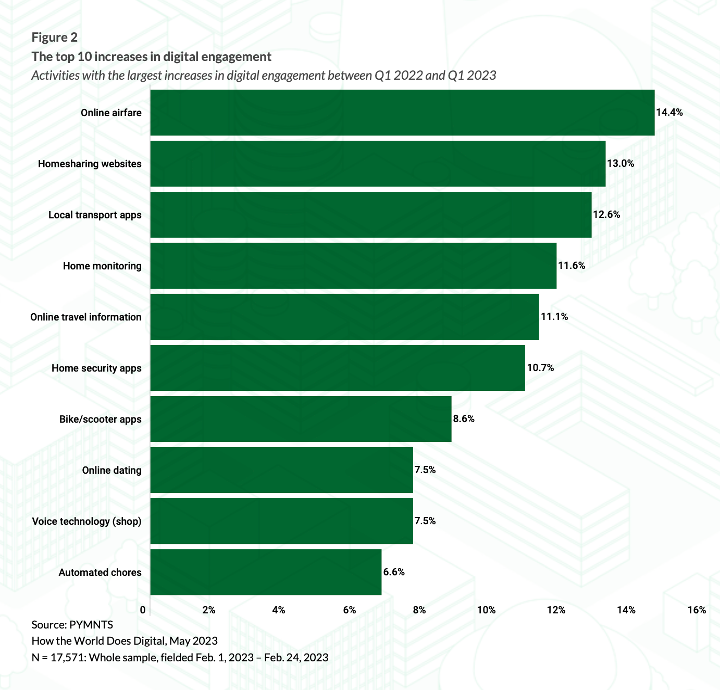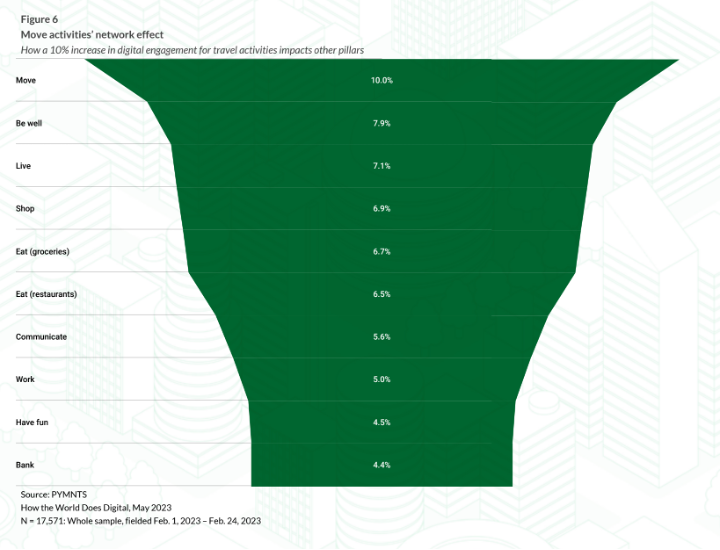Travel Drives Digital Engagement Growth Across Sectors

The digital transformation of economies is accelerating worldwide and reaching new heights. One of the major contributors to this acceleration is the travel and transportation sector, which has recorded the largest increase in digital engagement, according to PYMNTS Intelligence data. The reactivation of local transportation and the surge of international tourism, which is reaching momentum in countries such as the U.S., Spain and France, are the rationale behind this. This is proven when, among the top activities with the largest increases in digital engagement, we find three specific activities related to travel that stand out: purchasing online airfare, with engagement up 14%; local transportation apps up 13%; and seeking online travel information up 11%.
These are some of the conclusions drawn in “How the World Does Digital: Daily Digital Engagement Hits New Heights,” a PYMNTS Intelligence study that offers an overview of the state of the global digital transformation based on the Connected Economy™ Index.

The surge in travel and transportation services is not an isolated effect of digitalization, as it also affects other adjacent categories. By the network effect, travel also positively impacted the digital engagement of other categories, such as wellness or groceries, among others. Users may travel by plane and then use a riding app to reach their destination or order groceries to their Airbnb. Network effects refer to the interconnectedness between different digital activities, where engagement in one activity drives higher participation in others. For instance, a 10% increase in digital travel activities is linked to a 7.9% rise in health-related activities and a 6.7% increase in grocery orders. The network effect of digital activities is broadly described in the PYMNTS Intelligence study.
We find the origin of this digital acceleration in the proliferation of remote working that started during the pandemic and consolidated in subsequent years, especially in mature markets. Merchants have quickly understood that remote work and widespread digitalization have significantly changed not only consumers’ habits but also the way they shop. As a result, companies are launching new initiatives to capture cross-sell opportunities in those product categories that traditionally were not on the same shopping spectrum.

For instance, Uber recently partnered with convenience retail eCommerce platform Vroom Delivery to grow in non-restaurant sales. Uber knows well that their clients are leveraging its platform to find other products that are not local transportation or restaurant offerings. Indeed, a growing number of consumers are looking for more convenient eCommerce options in the market. In this example, the partnership combines in-house existing services with others’ product offerings and logistics capabilities.
In the case of airlines, AirAsia announced a team-up with Archipelago International, one of Southeast Asia’s largest hotel management groups. This partnership has expanded the AirAsia Super App hotel booking platform’s portfolio by more than 40,000 rooms and residences in over 200 locations across Southeast Asia, the Caribbean, the Middle East and Oceania.
In summation, the global digital transformation is surging forward, with the travel and transportation sector emerging as a significant driving force. By the network effect, it extends its influence on other adjacent categories contributing to further digitalization of the economy. Collaborations among merchants become strategic to capture business opportunities that arise thanks to more seamless eCommerce options.